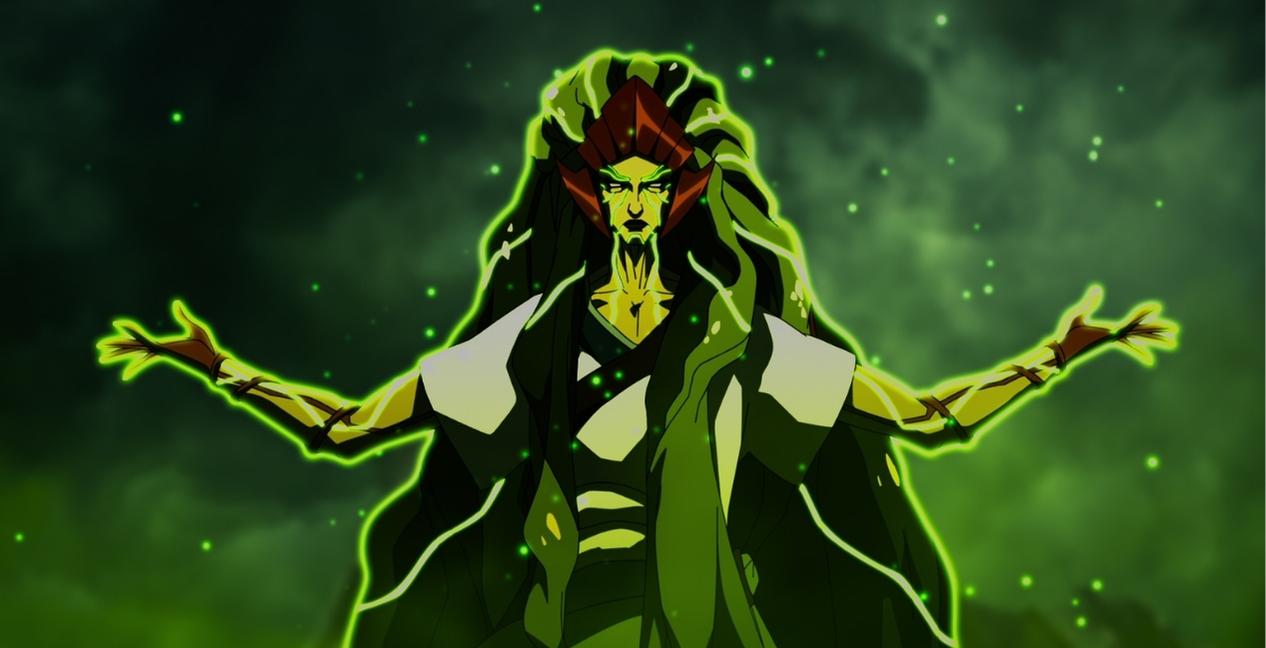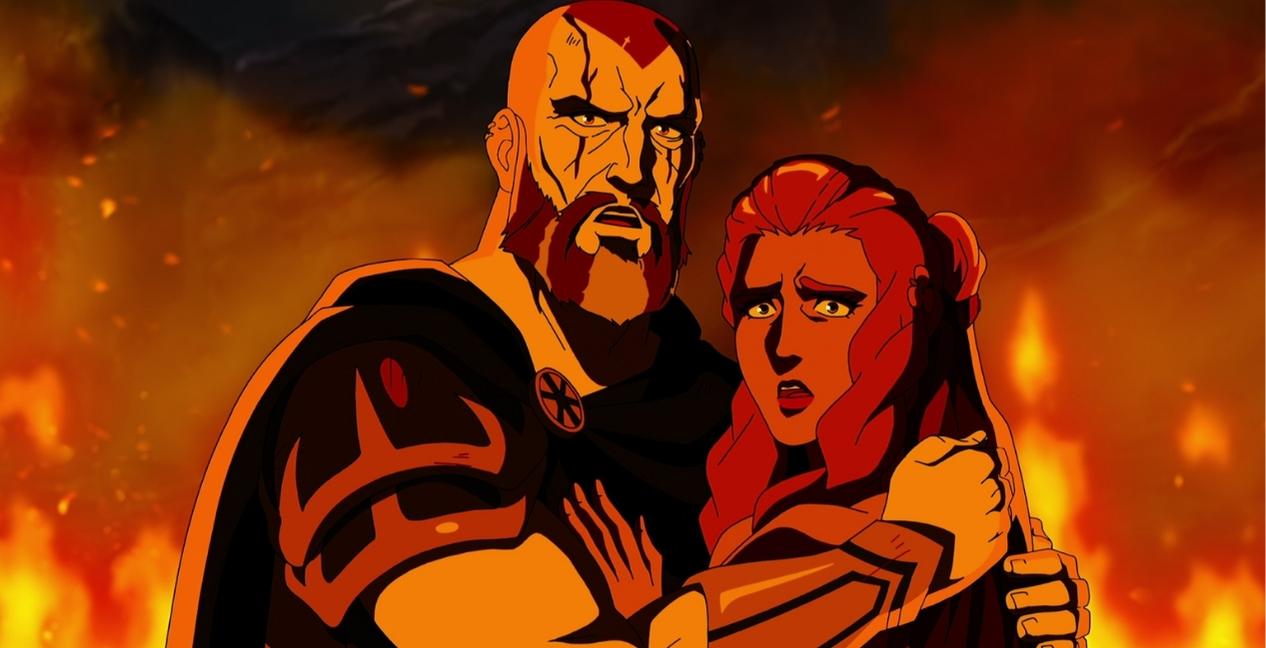Animated by Powerhouse Animation and released by Netflix, Blood of Zeus Season 3 brings Heron (Derek Phillips) and Seraphim’s (Elias Toufexis) story to a close. Created by brothers Charley and Vlas Parlapanides, with Jae H. Kim as supervising director, Blood of Zeus has been a stunning look into Greek mythology through two brothers, Heron and Seraphim. Originally shown as opposing sides, each season has developed the characters and broken traditional archetypes to do so. Blood of Zeus Season 3 continues this.
Picking up immediately after the events of last season, Gaia has awakened the Typhon as punishment. Because of their selfishness and fickle nature, Gaia has loosed a Titan who can bring their death, focused on restoring the primordial order. That means that Typhon is just the beginning, and freeing Chronos from Tartarus is the next step.
The opening of Blood of Zeus Season 3 is bleak. Typhon’s strength overwhelms god after god, and, for the first time, the Olympians are running scared. With an overwhelming force unleashed, the deep grudges must be set aside if they want to survive. That, of course, also extends to our dual protagonists, Heron and Seraphim.
Powerhouse Animation is the premier American animation studio. Having proven their expertise on series like Castlevania, its sequel, and Seis Manos, Blood of Zeus continues to be a beautiful adaptation of ancient myths. The gods are – once again – beautiful to look at. But, more importantly, the changed color palette paints each more solemnly than ever before. Their beauty is matched by their vulnerability this season, which is a difficult feat to capture, but the studio does it well.
Powerhouse Animation continues to set the standard for adult animation in the US.

Every emotional scene is captured as such because of the atmosphere the animation creates. The depth of the environmental art creates a world you want to enter. The animation of the facial expressions transforms these untouchable gods into children who turn to their parents for help. While the writing of the series is essential to success, the animation is just as important.
Blood of Zeus Season 3 is a stellar television season because of everything that came before it. As the series finale, the writers have invested time in capturing even the smallest moments from the past two seasons. Glances, comments, and even the most minuscule elements have built these vast and deep relationships. While some aspects of Season 3 may sometimes become too unwieldy with the number of plotlines, it’s wrapping up, when it’s self-contained within the context of the larger series, it’s brilliant.
This season hones in on exploring themes of guilt, love, atonement, and, most importantly, forgiveness. To do that, Blood of Zeus Season 3 has to look backward while keeping its endpoint in the center of the narrative bullseye. And it does just that. Across its three seasons, Blood of Zeus has told a story of grief, rage, and then, in this final season, compassion. This season delivers a thread of resolution that is brought through all of the characters we’ve gotten to know. Familial, romantic, and, surprisingly, our dual protagonists’ relationships with themselves. By the finale, every thread has thankfully been tied up.
Heron and Seraphim are the sum of their struggles in Netflix’s Blood of Zeus.

In Season 2, Heron and Seraphim stepped into the spotlight as the two pillars holding up the narrative. The series moved away from the protagonist and antagonist structure of the debut season and complicated its story by showing audiences that both brothers are worthy of rooting for, in their own ways. Redemption isn’t the core theme of the series, so much as atonement, guilt, and acceptance.
As the two brothers come together in Blood of Zeus Season 3, removing their transgressions against each other would have been easy. However, the importance of the series is about how people and gods move forward after they’ve been wronged. Their wounds heal, the scar stays, and it is what they do with the pain and bitterness that shapes a path forward.
While you could look at Season 1 as a coming of age for Heron, and Season 2 as an acceptance of a quest, Blood of Zeus Season 3 is the culmination. Wounded at the end of last season, Heron knows he has to die. His string was cut, and there is no escaping death. However, with that end in sight, Heron is devoted to making it mean something.
His life can’t be for nothing. As he works with Seraphim, it’s clear that while his death is on the way, it’s what he does with his life that will be honored. His devotion to humanity, and ultimately the kindness he shows Seraphim, is what comes into full focus, not his ability to fight.
On Seraphim’s end, the rage we have seen in the last two seasons continues to morph. Seraphim’s love for Gorgo continues to drive him in Blood of Zeus Season 3. However, throughout the eight episodes, he learns to set aside rage and selfishness to put her needs first. Even if it’s not what he wants. While Seraphim’s redemption began last season, the final season of Blood of Zeus doesn’t let him escape his sins. Instead, it interrogates his violence, his rage, and his love in a way that removes layers of the man beneath the monstrous exterior.
Family drives Blood of Zeus, and so does love.

Seraphim is just as worthy as Heron, not despite his transgressions but because of them. As his true role comes into focus in the last episodes of the season, Seraphim begins to understand himself and listen to others. He carries his sins, but he also atones for them. He isn’t looking for forgiveness, and I’d argue he isn’t even looking to be welcomed into Olympus.
However, in true Greek mythological fashion, the sum of his good deeds outweighs the bad. The bad is still there, but even without meaning to, he has started atoning. His anger is still there, held tightly for the gods he knows would use him as a pawn. But the story he fits into is larger than his desires, and once that clicks, he begins to take his place as a hero.
It’s a monumental feat that Blood of Zeus Season 3 somehow delivers thoughtful and deep endings for its two leads while also handling a large amount of the Olympians as well. The inability of the gods to accept responsibility and temperance is what has led Gaia to call forth Chronos (Alfred Molina) and the Titans. The gods are moved by their anger and their lust, and that blinds them. Gaia’s critique is that their selfishness leads to turmoil and chaos. But when you step back and look at this broken family, it’s how they come together in the last few episodes of Blood of Zeus Season 3.
Hades (Fred Tatasciore), Persephone, Demeter, Zeus (Jason O’Mara), Hera (Claudia Christian), Ares (Matt Lowe), Hephaistos, Poseidon, and the rest all come together with small but impactful storylines handled with nuance and respect. The gods coming together to fight the Titans was something I was unsure of at the end of Season 2. The Olympians have wounded each other so profoundly that I worried any reconciliation would feel forced. Blood of Zeus Season 3, however, tackles it without sanding off each of the gods’ rough edges.
Blood of Zeus Season 3 closes out the series with a powerful story of love and devotion.

While Hera remains a focus of the series, Blood of Zeus Season 3 gives audiences a different look at Hades and Persephone (Lara Pulver). The showrunners pull their love and devotion to each other into focus. Hades will do anything Persephone asks of him, even if that includes choosing the world over her when the time comes. But like many of the women in the series, Persephone isn’t a Damsel.
This final season allows Persephone to stand in her power as a goddess and not just as someone’s wife or daughter. Their storyline is deeply moving, even more so when Demeter (Cissy Jones) comes into the picture to acknowledge her mistakes in keeping them apart.
The most powerful thing about Blood of Zeus is that the gods are displayed as their most human selves. They are broken and flawed. In reality, nothing separates them from the humans they govern. It’s a choice that has grounded the series since the beginning. Hera’s rage was world-shaking, but it was also relatable. Ares wasn’t a warmongering god of violence but a son dedicated to his mother. And Hades and Persephone were two lovers kept from each other because those around them couldn’t believe their love.
What we do with the stories our ancestors told is important. We keep them alive as we iterate on them. Blood of Zeus is a beautiful example of this tradition. Greek mythology is one of pop culture’s favorite sandboxes, but in this Netflix Original series, we see a story that chooses to capture the humanity in it all. Two brothers are introduced into the world of the Olympians and what they leave behind them is a better understanding of compassion and change.
Blood of Zeus Season 3 ends with a line I haven’t stopped thinking about. “Some would say that this terrible struggle was needed. For the forest does not grow until the underbrush is burned.” Blood of Zeus, for all of its mythology, is a profoundly human story. And that’s what makes it a natural and beautiful addition to the gods of Olympus because the gods have always been reflections of us. They’ve held our anger, love, lust, and piety, and it’s been reflected in how they’ve been represented over time. Blood of Zeus Season 3 is a powerful end to an epic.
Blood of Zeus Season 3 is streaming now, exclusively on Netflix.
Catch Up on the Series
Season 1 | Season 2
Blood of Zeus Season 3
-
Rating - 9.5/109.5/10
TL;DR
Blood of Zeus, for all of its mythology, is a deeply human story. And that’s what makes it a natural and beautiful addition to the gods of Olympus…Blood of Zeus Season 3 is a powerful end to an epic.







